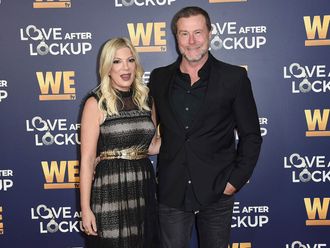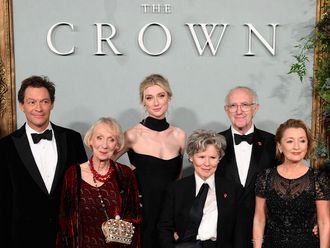
When the trailer for the new Netflix series Insatiable arrived last month, it was met with fierce criticism on social media and elsewhere; a Change.org petition calling for it to be pulled from release has over 200,000 signatures as of this writing. The objection was over the show’s premise: A bullied teenager, Patty (Debby Ryan), seeks revenge when she loses weight because she has to have her mouth wired shut.
The cast and producers of Insatiable, including actress Alyssa Milano, have offered rebuttals to the accusations of body-shaming. Ryan shared her own struggles with body image on Twitter: “I was drawn to this show’s willingness to go to real places about how difficult and scary it can be to move through the world in a body.” And Cindy Holland, Netflix’s vice president for original series, defends the show as a satire meant to critique fat-shaming.
- DEBBY RYAN | Actress
Despite the petition, Insatiable released on Friday. Is it really as offensive as the trailer has led many to believe? Here, Eleanor Stanford and Aisha Harris, TV editors at The New York Times, discuss the first season. Major spoilers follow.
Aisha Harris: I was admittedly apprehensive going into the first episode based on the trailer, but once I watched it, I was shocked to realise that an insensitive representation of bullying and obesity might actually be the least of this show’s problems. In the first episode alone the following things occur: A woman, upset that her daughter does not win a pageant, falsely accuses the pageant coach, Bob Armstrong (Dallas Roberts), of molesting her daughter. Patty, who is 17, decides that she’s going to lose her virginity to Bob and leads on a classmate she has no interest in so he will do her bidding. She also plots to get revenge on the man who broke her jaw — which is why it was wired shut — by sleeping with, then rejecting him.
Eleanor Stanford: The whole messy show hinges on this question. The creator Lauren Gussis’ approach seems to have been to throw as many inflated, controversial plot points as possible against the wall to see what sticks. As far as I’m concerned, this is not satire, or at least not successful satire. That false accusation against Bob is a good point of entry: No, he’s not a sexual predator, though he does himself no favours. (A running joke has him spouting clunky double entendres like ‘I’m a champion of women, especially young women, I wanna touch as many of them as I possibly can.’) And yet, he is still a predator of sorts, lasciviously seeing a teenage girl’s new and ‘improved’ body as his ticket to professional success.
As he schemes to manipulate her into competing in pageants and she schemes to seduce him, I lost track of what we were supposed to find funny or how any of this satirised fat-shaming.
I totally agree that a show I was expecting to be fatphobic turned out to be problematic in seemingly endless new ways. But I guess we should talk about how Insatiable treats Patty’s binge-eating — or fails to treat it in any meaningful way. It reminded me of the criticisms of Netflix’s 13 Reasons Why and its sensationalised depiction of teen suicide. Teenagers deserve better.
Harris: Oof, yes. That’s a huge part of what elevates this above merely offensive and into the realm of potentially damaging. As a show that appears to be targeted toward the YA set, it’s disturbing to see Patty and Bob bond over their shared eating disorder and encourage each other to essentially use their food cravings as motivation — to win, to seek retaliation, to earn someone’s trust, or some combination of all three (as seen in that mortifying scene where Patty pressures him to win the crawfish eating competition in order to prove he’s “willing to risk it all” to help her win the pageant).
The problem is that Insatiable doesn’t seem to view Patty and Bob’s eating disorder as a disorder, or something that needs to be addressed directly with the aid of trained a professional; instead, it imagines it as a character flaw that leads them to act out as vapid, terrible human beings.
I don’t want to discount Gussis’ experience, because I know Patty’s story of her physical transformation is partly inspired by her own life. But I was so confused by what this show thought about the relationship between outward appearance and personality. Almost every episode finds Patty declaring, in the voice-over narration, that being thin doesn’t matter after all because she’s still evil inside. Tonally, it seemed to be going for the subversive wit of Mean Girls but instead landed closer to Family Guy — empty, scattershot provocation for its own sake.
And what in the world was that scene in which Patty and the random trans woman we never see again commiserate over body dysmorphia?
Stanford: Yeah, that character popped up to represent the specific body-related trauma frequently experienced by trans people, wasn’t developed in any way and then disappeared never to be seen again. It was indicative of the way the show exploits marginalised identities in general.
Harris: Somehow the writers thought they were being clever with the many references to old high school comedies. At one point Christian (James Lastovic), Patty’s bad-boy love interest, and Magnolia (Erinn Westbrook), her pageant rival, decide to team up to make their respective crushes jealous by dating each other, “like in one of those stupid movies from the ‘80s.” But cheap meta jokes like this are old hat at this point.
I agree there are some charming and moderately successful moments, but they come way too late, and I wouldn’t call them redeeming, either. I liked Nonnie’s slow progression toward self-discovery about her sexuality in the later episodes, which leads to heartfelt moments about fluidity. Before you get to that, you have her being weird and borderline predatory toward a somehow oblivious Patty — her lifelong best friend — like when she convinces Patty to re-enact an intimate moment she had with someone else, so Nonnie can feel her up.
The tone is equally off in the way it handles subjects as delicate as revenge porn and domestic abuse — which brings me to the last few episodes and Christian, the bad boy. As the show goes on, his obsession with Patty takes on an unhealthy tenor; he refuses to accept that she no longer wants to be with him and stalks her. Yet all any of the characters do, including Patty, is acknowledge that he’s being abusive and then shrug it off. This is all without getting into the ending, when Christian kidnaps Magnolia, then tells Patty she has to kill her. I don’t even know what to do with that.
Check it out
Insatiable is now streaming on Netflix.














